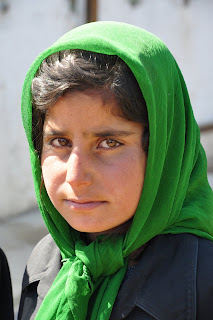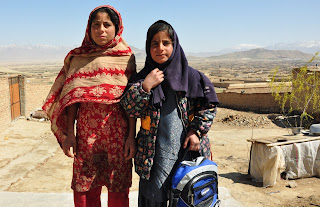 Sahera holds a copy of Beyond Belief. Her picture became the movie poster and DVD cover for the film.
Sahera holds a copy of Beyond Belief. Her picture became the movie poster and DVD cover for the film. Three years ago, I had one of the most powerful filming experiences of my career. Susan Retik and Patti Quigley, the two September 11th widows featured in my film Beyond Belief met Sahera Naznia, an Afghan war widow. On the surface, they had absolutely nothing in common--Susan and Patti lived in Boston's wealthy suburbs and enjoy women's rights to their fullest. Sahera was struggling to feed her children and was not permitted to leave the house without wearing a burqa.
But the women connected--as widows, as mothers, as women.
When Susan found out I was heading back to Afghanistan she asked me if I would deliver a video message. The idea of reconnecting with Sahera was almost too good to be true. Despite the fact that she's illiterate (90% of the 500,000 widows in Kabul are), Sahera was one of the most eloquent and poetic women I have ever interviewed.
But would we be able to find her? The search was on.
Thanks to the incredible efforts of so many CARE International staff (Monte, Jasveen, Amy and Zora), we found Sahera! We decided to meet at a CARE Poultry Center in Kabul's District 5, an area that has been hit with three suicide bombings in the past month.
From a second story window, I watched Sahera arrive with her sister-in-law and was surprised she wasn't wearing a burqa. Three years ago she told me that although the burqa blinded her and made her dizzy, she was forced to wear it by her in-laws who told her that a widow--especially a young and beautiful one like herself--could not be seen in public.
"But when my mother-in-law died two years ago, I threw that thing away," she told me this morning. "She was the one who insisted. Now, I don't have to wear it any more. I was so happy to get rid of it," she giggled.
It was the same beautiful and animated Sahera.
 (Kevin films as Sahera and her sister-in-law, Sadiqa, watch Susan's video message.)
(Kevin films as Sahera and her sister-in-law, Sadiqa, watch Susan's video message.)Her eyes lit up even more when I played Susan's video message. "I am so happy that Beth is back in Afghanistan to share this with you," Susan's voice rose from my laptop. "I feel such a connection to you... I miss you, and I love you."
Susan shared news from her life--remarried now to Donald Ger, they welcomed baby Rebecca into the family last year. Sahera was visibly moved, "I'm so happy for her. I can see how happy she is," Sahera beamed.
Sahera is doing well, too. When I met her in May 2006, she was part of a poultry program supported by Susan's organization, Beyond the 11th, and she earned money by selling the eggs. It was just enough to support herself and her five children. But when chickens in the village started getting sick, Sahera sold her birds and focused on sewing.
"Selling the chickens gave me money to buy fabric, and now women in the village hire me to sew." It's enough, she says, so that all of her children can go to school. But they still struggle. When her oldest son was accepted at Nangharar College in Jalalabad earlier this year, he had to turn it down because she can't afford the dormitory fees.
"It's still my dream," Sahera says, "that my son will be the first person in the family to go to college."
In her video message, Susan acknowledged all that Sahera has been through in her life. "I hope that when your children get older they have the strength and dignity that you possess. They are so lucky to have you as a mother."
"The bond that we have is not typical," Sahera said of her feelings for Susan. "We are not just two people who have met. We are like sisters. I hope that we will meet again."
















